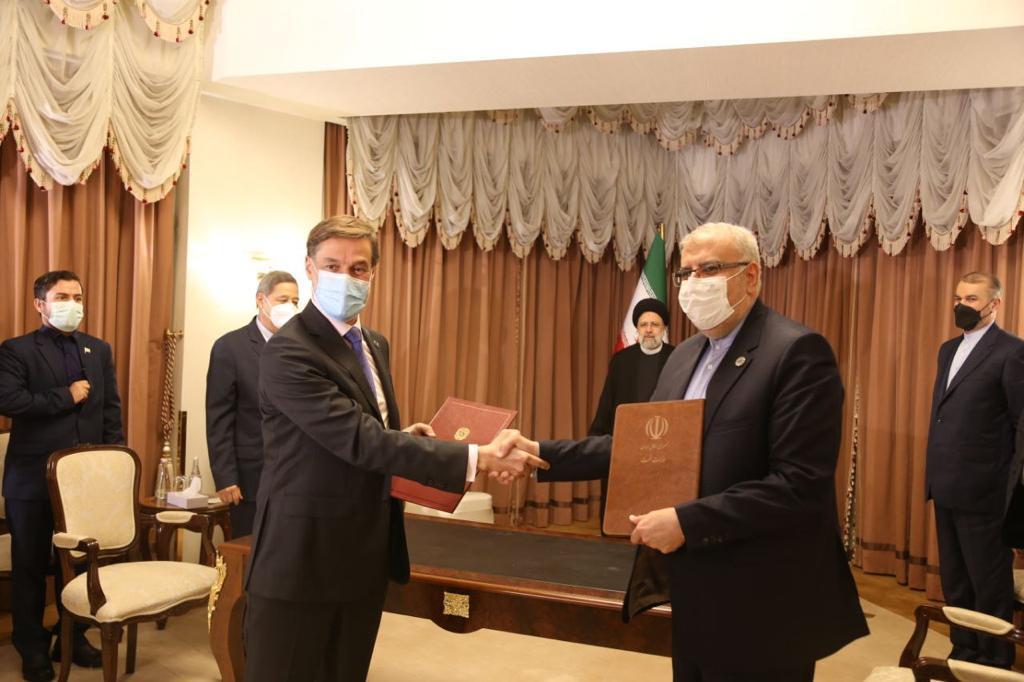
Venezuela and Iran Deepen Hydrocarbon Alliance, Blast US Sanctions
Guayaquil, Ecuador, February 23, 2022 (venezuelanalysis.com ) – Venezuela and Iran have signed a memorandum of understanding to increase bilateral cooperation in the hydrocarbon sector.
The new agreement was reached on Tuesday on the sidelines of the VI Summit Gas Exporting Countries Forum (GECF), celebrated in Doha, Qatar. During the two-day event, Venezuelan Foreign Minister Félix Plasencia held meetings with Iranian President Ebrahim Raisi and Oil Minister Javad Owji to revise the countries' economic ties and extend collaboration in several areas.
'We signed an important Memorandum of Understanding aimed at expanding bilateral cooperation and our exchanges, mainly in hydrocarbons,' stated Plasencia on Twitter.
The Venezuelan official stressed that the allied nations seek to“continue countering the illegal and arbitrary unilateral coercive measures imposed by the United States against our peoples.” Iran and Venezuela are both under far-reaching sanctions regime programs imposed by Washington.
“Iran and Venezuela move forward in consolidating their strategic partnership,” added Plasencia. Caracas' top diplomat also met with officials from Malaysia, Egypt, Nigeria, Mozambique , Azerbaijan and Equatorial Guinea to establish cooperation routes in the energy sector.
In turn, Iranian Oil Minister Javad Owji said his country was committed to ramping up assistance for development projects in Venezuela's oil industry, currently deteriorated and severely halted after US unilateral measures barred the industry from foreign investment.
“The memorandum of understanding reached with Venezuela covered the renovation and modernization of oil and gas refineries, the transfer of technology and the provision of technical and engineering services,” Owji told the IRNA news agency.
President Ebrahim Raisi likewise highlighted Venezuela's resistance despite“intense pressure” caused by US financial sanctions, pledging Tehran's commitment to“assist the Venezuelan people in changing their economic situation.”
Iran has been an important ally to Venezuela in recent years as the South American nation struggles to offset the negative impact of US sanctions on its oil industry, the source of over 90 percent of the country's foreign income. In 2017, the US Treasury Department levied financial sanctions against state oil company PDVSA followed by an oil embargo in 2019, while targeting shipping companies and multinational corporations as well.
Washington's coercive measures saw PDVSA cut off from international markets and foreign companies were no longer able to operate in joint oil ventures. As a result, crude production fell from 1.9 million barrels per day (bpd) in 2017 to less than 500,000 bpd by the end of 2020.
Additionally, Venezuela has faced acute fuel shortages after the former Trump administration banned diluent and fuel imports in June 2019 and put an end to crude-for-diesel swaps in October 2020.
In response, Caracas first turned to Iran for assistance. Throughout 2020, Theran sent several gasoline cargoes while also providing technicians, equipment and materials needed for revamping refineries. The cooperation later extended to an oil-for-condensate swap deal signed in September 2021.
The Iranian light crude is mixed with Venezuela's heavy oil to facilitate transportation making it possible to lift crude exports, mainly to Asian markets. At least five shipments of the much-needed diluent have arrived in the Caribbean country, each carrying some 2.1 million bpd. On February 16, the latest supertanker reportedly docked on the José oil terminal, located in the northeastern Anzoátegui state.
With the steady supply of condensate, Caracas has managed to ramp up oil production, averaging some 650,000 bpd in 2021 and momentarily reaching the one million bpd government-set target in December, according to PDVSA sources. Oil exports increased as well with the country shipping roughly 627,000 bpd, halting a four-year fall.
However, in January oil production and exports declined slightly, registering 668,000 bpd and 416,387 bpd, respectively. According to Venezuelan oil expert Carlos Mendoza Potellá, the drop came as a consequence of Iran's condensate cargoes only restarting in February.
“While there have been some efforts toward recovering the oil industry, they are far too small, too marginal, and too dependent on diluents coming from Iran,” he explained in a recent interview with Venezuelanalysis.
Despite the setback, the slow crude production recovery has led to timid positive signs in Venezuela's economic landscape, which has been favored by rising oil prices. Brent crude registered a US $99.50 peak on Tuesday, the highest mark since September 2014. The number went down to $91.80 a barrel on Wednesday, still above previous years.
In Tuesday's Doha summit, government representatives discussed measures to preserve stability in global hydrocarbon markets against the backdrop of mounting tensions with Ukraine and NATO as well as Washington's newly imposed sanctions on Russia following Moscow's recognition of Luhansk and Donetsk's independent republics.
Venezuela and Iran celebrated efforts to stabilize the markets while denouncing the need to stop Washington's coercive measures which severely hampered their industries. The two nations rank seventh and second in natural gas reserves worldwide, respectively.
Edited by Ricardo Vaz from Caracas.
MENAFN23022022000214011058ID1103754596

Legal Disclaimer:
MENAFN provides the
information “as is” without warranty of any kind. We do not accept
any responsibility or liability for the accuracy, content, images,
videos, licenses, completeness, legality, or reliability of the information
contained in this article. If you have any complaints or copyright
issues related to this article, kindly contact the provider above.

















Comments
No comment